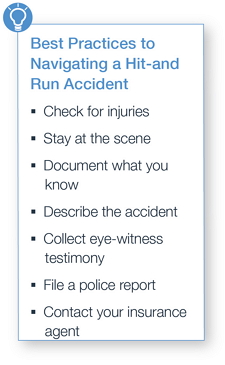Gathering as much information as possible at the scene is key to a positive resolution.
If you’ve been a driver
for at least a few years, it’s likely that you’ve experienced minor dings or
scratches from unknown drivers. While we grit our teeth at these small annoyances,
what should you do if another driver hits your vehicle and speeds off?
If you’re the victim of a hit-and-run accident, it’s
important to remain calm and gather as much information as possible for both
your insurance company and the police. Thorough documentation will speed up the
claims process, and help you get your car repaired as quickly as possible. Here
are some tips and best practices for handling a hit-and-run accident so you can
be prepared if this unfortunate event happens to you.
 Check
for injuries: For any type of accident, it’s most
important to make sure you and any passengers are okay. Call an ambulance if
necessary and document any injuries sustained at the time of the accident.
Check
for injuries: For any type of accident, it’s most
important to make sure you and any passengers are okay. Call an ambulance if
necessary and document any injuries sustained at the time of the accident.
Stay
at the scene: Do not chase after the other driver
hoping to catch them. This could result in further damage to yourself or
others. Leaving the scene will also eliminate your ability to collect
eyewitness accounts, a very important part of documentation for both the police
and your insurance carrier.
Document
what you know about the other driver: It’s important to write
down as much information about the other driver, their car and the accident as
possible. Useful information about the driver includes their car’s license
plate number, the make, model and color of their vehicle, a description of the
damage to their car, and the direction in which they were heading.
Describe
the accident: Take photos of the damage to your
vehicle, note the location, time and cause of the accident.
Collect
eyewitness testimony: See if any bystanders can supply
additional information about the accident. If possible, have them give you or
the police an official statement describing the event. Make sure to gather
their names and contact information. An eyewitness account is especially useful
if you were not with your vehicle when the accident occurred.
File
a police report: Even if the police do not show up to the
scene of the accident, it is important to file a police report. The official
accident report will help police search for the responsible driver, and will be
invaluable to you during the claims process.
Contact
your insurance agent: Call your insurance carrier as soon
as possible to file an accident claim. Provide them with all the documentation that
you have gathered about the accident, as well as the number of the police
report. The more information you can provide, the more efficient the claims
process will be.
Remaining calm and following these tips will
hopefully make a bad situation a little more bearable. Contact a HUB International personal insurance agent today for more information.